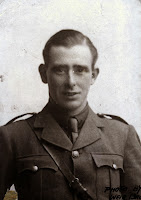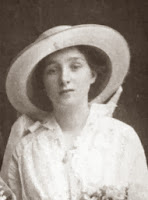Welcome to The Kelly Bulletin
The Kelly Bulletin was produced every month during 1917 and 1918 of World War 1 by Annie Kelly, who lived in Glasgow. As a grand-daughter of Annie Kelly, I decided to scan in these valuable pages to enable everybody to enjoy reading them and experiencing a period in history. (by Jennifer Wilson)The bulletin was sent by Annie to her brother, John Kelly, who spent most of 1914-1918 fighting at the front. (here are photographs of Annie and John at that time).
Find out more about the Kelly family, who originated in Ashton Lane in the West End of Glasgow by clicking our links to the page of photographs on the right.
And see what you can discover by reading the bulletins which we have managed to save. These ones were brought back from the front by John Kelly towards the end of the war. They had been read by others in the trenches and each month the men looked forward to hearing news from home.
You will find all sorts of news in the Bulletins :
- Latest news from the war
- News from Glasgow or wider news of what was happening in the UK
- Cartoons
- Poems
- and even some wonderful pictures of the fashions of the time as Annie tried to keep the men's spirits up by thinking of all the girls waiting for them back home.

Let us know what you think. What does it tell you about how much the people who had stayed in the UK were involved in the war ? What do we find out about John Kelly and how he was coping with the war ? and I am sure you can come up with lots more from reading through the journals. There is lots to read and some fantastic forgotten poems.
Below is a fantastic and very touching poem about a battery horse which we found in the journals.
I now think the poet is a Corporal or Lance Corporal E.R. Henry, due to a reference found in "Tommy Rot: WWI Poetry They Didn't Let You Read" by John Sadler, Rosie Serdiville I can find no other record of the poem online. Although I suspect the author may be an Australian war poet, based on the second verse (and they are maybe referred to in the following link as a WW1 soldier and witness http://www.leedsww1memorials.com/australia.htm).
_______________________________
Below is a fantastic and very touching poem about a battery horse which we found in the journals.
I now think the poet is a Corporal or Lance Corporal E.R. Henry, due to a reference found in "Tommy Rot: WWI Poetry They Didn't Let You Read" by John Sadler, Rosie Serdiville I can find no other record of the poem online. Although I suspect the author may be an Australian war poet, based on the second verse (and they are maybe referred to in the following link as a WW1 soldier and witness http://www.leedsww1memorials.com/australia.htm).
_______________________________
He whinnied low as I passed by,
It was a pleading sort of cry ;
His rider, slain while going back,
Lay huddled on the muddy track.
And he, without a guiding hand,
Had strayed out on the boggy land;
And held there by the treacherous mire,
He lay exposed to shrapnel fire.
He was a wiry chestnut steed,
A type of good Australian breed;
Perhaps on steep Monaro’s height,
He’d followed in the wild steer’s flight.
Or out beyond the great divide
Roamed free where salt bush plains are wide,
Or through the golden wattle groves
Had rounded up the sheep in droves,
Then slipped away to feed the guns,
And help the boys to strafe the Huns.
His load was eighteen-pounder shells,
The sort that in a barrage tells.
I drew the shells from out their sheath
And out his girth from underneath,
Then lifted off his saddle pack
To ease the weight and free his back.
His muzzle softly nosed my hand
Because I seemed to understand.
My steel hat from an old-time trench
I filled three times his thirst to quench;
I brought my ration biscuits back,
And fed him from my haversack.
No horse that had been stable fed
More proudly tossed his chestnut head
Because a stranger saw his need,
And, passing, stayed to give him feed.
But time pressed on, I must not stay,
Four weary miles before me lay.
He made a gallant bid to rise,
Then sank with almost human sighs;
I hoped a team might see his plight,
And draw him out before the night.
Now, you may ask, why in this strife,
When times were grim and death was rife,
I should have ventured from my course
To try and help a battery horse ?
I’ll tell you why, I felt his need,
Poem possibly by Lance Corporal E.R. Henry
________________________________





